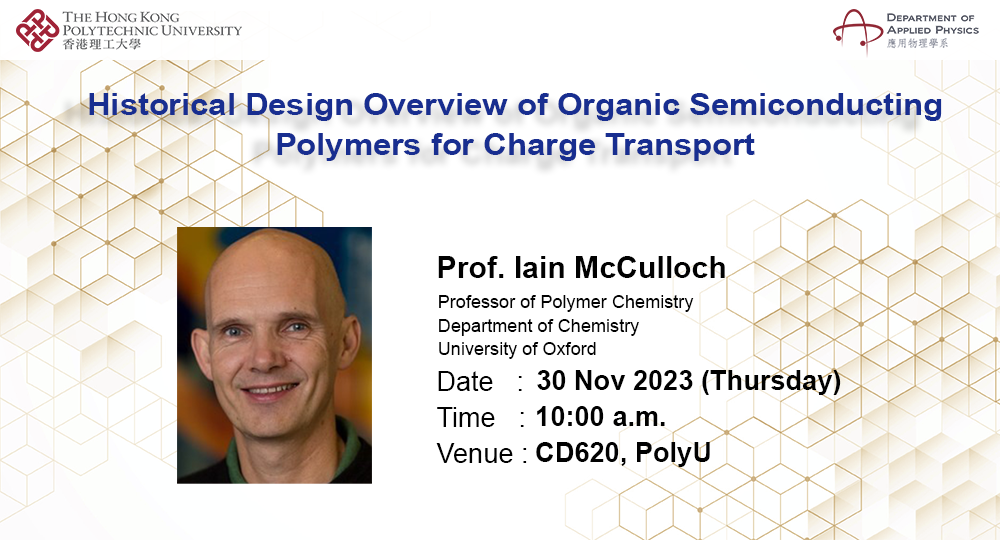AP Seminar - Historical Design Overview of Organic Semiconducting Polymers for Charge Transport

-
Date
30 Nov 2023
-
Organiser
-
Time
10:00 - 11:00
-
Venue
CD620, 6/F, Wing CD, PolyU Map
Speaker
Prof. Iain McCulloch
Summary
Understanding the impact of both the organic semiconducting polymer design and processing conditions, on both molecular conformation and thin film microstructure has been demonstrated to be essential in achieving the required optical and electrical properties to enable a range of devices. Synthesis of conjugated aromatic polymers typically involves carbon coupling polymerisations utilising transition metal catalysts and metal containing monomers. This polymerisation chemistry creates polymers where the aromatic repeat units are linked by single carbon-carbon bonds along the backbone. One consequence of this single bond link is that the aromatic repeat units have the freedom to twist with respect to each other, introducing energetic disorder. We present design and synthesis strategies to restrict or even eliminate this tortional disorder through enhancement of non-covalent interactions. We will take a close look at the molecular features responsible for the high charge carrier mobility of the indacenodithiophene-co-benzothiadiazole copolymer, a benchmark polymer for organic transistors. We will highlight the influence of conformational coplanarity and side-chain assisted self-assembly to create efficient one-dimensional transport along conjugated polymer backbones, with sterically free “crossing points” allowing interchain hopping. Additionally, an aldol condensation reaction was explored, in which a bisisatin monomer reacts with a bisoxindole monomer to create an isoindigo repeat unit that is fully fused along the polymer backbone. This aldol polymerization requires neither metal containing monomers or transition-metal catalysts, opening up new synthetic possibilities for conjugated aromatic polymer design, particularly where both monomers are electron deficient. Polymers with very large electron affinities can be synthesized by this method, resulting in air stable electron transport.
References:
McCulloch et. al. “Liquid-crystalline semiconducting polymers with high charge-carrier mobility” Nat. Mater. (2006), 5(4) 328.
Sirringhaus and McCulloch et. al. “Approaching disorder-free transport in high-mobility conjugated polymers” Nature. 2014, 515, 384-388.
McCulloch et. al. J. “Modification of Indacenodithiophene-Based Polymers and Its Impact on Charge Carrier Mobility in Organic Thin-Film Transistors” J. Am. Chem. Soc. 2020, 142, 2, 652–664.
Keynote Speaker
Prof. Iain McCulloch
Professor of Polymer Chemistry
Department of Chemistry
University of Oxford
Iain McCulloch is a Professor of Polymer Chemistry in the Department of Chemistry at the University of Oxford since 2020. Prior to this, he held joint appointments as Professor of Chemical Science and Director of KAUST Solar Center at KAUST, as well as a Chair in Polymer Materials in the Chemistry Department at Imperial College. Previously, he spent 18 years managing industrial research groups at Hoechst in the US and Merck in the UK. He is a Fellow of the Royal Society, the Royal Society of Chemistry, the European Academy of Sciences and a Member of Academia Europaea. He is the recipient of the 2022 Royal Society Armourers and Brasiers Prize, the 2020 Blaise Pascal Medal for Materials Science, the Royal Society of Chemistry 2020 Interdisciplinary Prize, 2014 Tilden Medal for Advances in Chemistry and the 2009 Creativity in Industry Prize. His interests are in the design and investigation of organic semiconducting materials.




